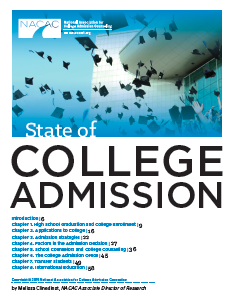11 May 2015
NACAC State of College Admissions Report 2014
 The National Association for College Admissions Counseling released its 2014 State of College Admissions report last Thursday.
The National Association for College Admissions Counseling released its 2014 State of College Admissions report last Thursday.
We had an opportunity to review the 72 page report and took away some key points about overall application and early admission trends.
The findings strongly reinforce the need for students and families to actively evaluate early admission opportunities as an integral part of their college plan.
Click on Continue Reading below for the summary.
Here's what we learned:
- The number of college applicants has peaked. The number of high school graduates has peaked at 3.4 million. Of this amount, 63% enrolled in 4 year colleges and universities. As expected, the enrollment rate for public schools is closer to 50%, and in excess of 90% for private schools.
- The number of applications submitted per applicant continues to rise. According to the report, 32% of students submitted 7 or more applications in 2013, up from 22% in 2008 and 28% in 2012. This helps explain why nearly two thirds of of participating colleges reported a rise in the number of applications for fall admission.
- More students are applying via early admission. The percentage of colleges reporting an increase in early decision (ED) and early action (EA) applicants increased from 50% and 69% in 2012 to 56% and 78% respectively in 2013.
- More students are getting admitted via early admission. Colleges are taking note of applicants making the effort to apply early. Overall, 49% of colleges reporting early decision results for the report reported an increase in admitted applicants, versus 16% reporting decreases and 36% reporting no change. On the early action front, 68% reported increased ED admits vs. 13% decreased and 19% no change.
- There continues to be an admission rate advantage for applicants applying early. The mean percentage of ED applications accepted was 64% vs. the mean overall admission rate for institutions with Early Decision was 53.2%. For early action, the mean percentage of EA applications accepted was 66.7% vs. 65% overall. This too is consistent with our expectations, as early decision is binding and therefore more advantageous to colleges than early action.
Bottom line: the NACAC report confirms that the use of early admission is on the rise and it provides admission advantage for savvy college applicants. Our internal analysis suggests that the advantage is even more pronounced at more selective institutions.
While early admission may not always be appropriate, it should always be considered as part of your college plan. The advantages are typically too big to ignore. For more information, check out this article on early admission and how to take advantage of it, or learn how College Kickstart makes this a piece of cake.
Get our latest data and insights
Give your college plan a boost
Balance list, maximize odds and minimize wasted motion. Current data and personalized recommendations.
Students, learn more Counselors, learn more
Archives
- Your College List (110)
- Early Admission (251)
- Standardized Testing (16)
- Class of 2029 (53)
- Class of 2028 (54)
- Class of 2027 (64)
- Class of 2026 (62)
- Class of 2025 (78)
- Class of 2024 (69)
- Class of 2023 (87)
- Class of 2022 (82)
- Class of 2021 (80)
- Class of 2020 (65)
- Class of 2019 (6)
- Waitlist (11)
- Financial Aid (4)
- College Tour Planner (0)
- Whirlwind Tours (0)
- Essays (9)
- College Kickstart (58)
- Product Announcements (12)
- Perspectives (102)
- College Rankings (28)
- Affordability (12)
- AP Exams (3)
- Miscellaneous (11)
Hot Topics
- Harvard
- Early Action
- University of Pennsylvania
- UC Santa Barbara
- Vanderbilt
- Columbia
- Boston College
- Emory
- Bowdoin
- Northwestern
- Notre Dame
- Duke
- Cornell
- Stanford
- University of Virginia
- Wesleyan
- Georgetown
- Princeton
- UCLA
- Ivy League
- UC Davis
- UC Berkeley
- Rice
- Middlebury
- Class of 2022
- UC Irvine
- Johns Hopkins
- Colby
- Class of 2023
- Brown
- Boston University
- Georgia Tech
- Williams
- Pomona
- MIT
- Yale
- Claremont McKenna
- Dartmouth
- Early Decision
- Class of 2021